Following
the Trickster
Copyright © 2010
by Richard S. Platz, All
rights reserved
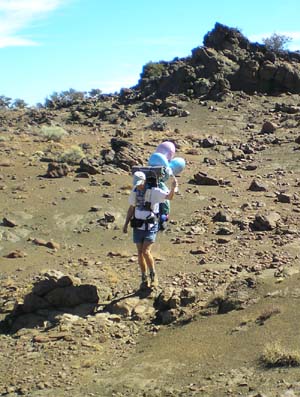
(Click on photos to enlarge)
Fox Creek, Virginia, and Section Line Lakes Backpack
Trinity Alps Wilderness
Klamath National Forest
August 21-24, 2009
Photos by the
Author and Barbara Lane Except Where Noted
"We would carry him along in our hearts"
Our friend Mr. Popper, master of practical jokes,
had died the previous Fall. On the final day of September he
succumbed to a glioblastoma. Nancy had been at his side. He
never intended to leave her alone – his love, his companion,
his soul mate and friend – but what could he do? Ol' Death
had come unbidden that night and whisked the Trickster away.
Rudely summoned from her lullaby of lifelong
harmony, Nancy awoke to a nightmare of bereavement. She dealt
with it the best she could. Ten months of tattered days had
fluttered past by the time we invited her to join us on a four-day
backpack into Fox Creek Lake. Popper and Nancy and Barbara and
I had backpacked several times together, most recently in August
2006 to Patterson Lake in the South Warner Wilderness (see Highway 299 Revisited
). That
was Popper's last backpack. Now, being dead, he could of course
no longer shoulder a backpack. So instead we agreed to carry
him along in our hearts.
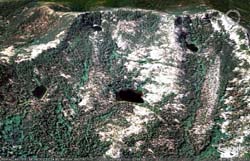 Fox
Creek Lake is one in a cluster of four lakes situated in a high
rocky canyon at the head of the Fox Creek drainage on the northernmost
slopes of the Trinity Alps Wilderness. Glaciers had ground out
cirques from the Mesozoic granite bedrock of the Craggy Peak
Pluton, spilling the tailings northward as an apron of moraine.
Fox Creek cuts northward from the lakes through the glacial
till to join the South Fork of the Scott River, thence the flow
continues north to irrigate alfalfa fields of the Scott Valley.
Of the four, only Fox Creek Lake and Mavis Lake can be accessed
by a maintained trail.
Fox
Creek Lake is one in a cluster of four lakes situated in a high
rocky canyon at the head of the Fox Creek drainage on the northernmost
slopes of the Trinity Alps Wilderness. Glaciers had ground out
cirques from the Mesozoic granite bedrock of the Craggy Peak
Pluton, spilling the tailings northward as an apron of moraine.
Fox Creek cuts northward from the lakes through the glacial
till to join the South Fork of the Scott River, thence the flow
continues north to irrigate alfalfa fields of the Scott Valley.
Of the four, only Fox Creek Lake and Mavis Lake can be accessed
by a maintained trail.
I had been to Fox Creek Lake before with the
Annual Spring Acid Backpack Group. That was in July of 1984.
A quarter of a century had passed, and my recollections were
faded and threadbare, though some few swatches of whole cloth
remained.
On one such scrap I found embroidered memory
of the steep hike up to the lake. James Aaron and Joan had joined
me from Chico. As we sweated uphill in the blazing sun, I recall
observing, "Every backpack is painful. It's just
that the pain lasts longer on some than on others."
I recall it all because that same thought has returned like
a homeless pigeon during subsequent hikes of every season.
Mr. Popper played a memorable role on that earlier
trip. He had led the group on a dayhike from Fox Creek Lake,
where I believe we were camped, over the ridge to Virginia Lake,
thence cross-country up to the Pacific Crest Trail on the high
granite cliff above Section Line Lake. I recalled nothing of
Fox Creek or Virginia Lakes, not the forest, not our campsite,
not the terrain. But seared into my memory was that act of pure
madness when, following Popper, we had scrambled down a vertical,
rocky couloir on an ill-advised and dangerous shortcut from
the PCT straight down to the south shore of Section Line Lake.
Everyone on the dayhike had followed along. Not one had turned
back. Peer pressure ruled, I guess, and youthful delusions of
indestructibility. Miraculously, no one had broken a single
bone. Clearly I recall the plunge of sweet relief into the icy
waters of the lake and then sunning ourselves naked on the rocks.
Neither Nancy nor Barbara had been to Fox Creek
Lake. Though we included it annually on our list of possible
backpacks, it was a chance conversation at a birthday party
a few weeks earlier that had determined our fate. Barbara had
chatted at length with a new acquaintance, an avid backpacker,
who advertised Fox Creek Lake as one of her favorites.
I could not recall the lake at all. The map gave
the trail distance as four miles and the climb 1,300 feet. Not
insignificant, but hopefully still within our range. The suicidal
scramble down to Section Line Lake from the PCT could easily
be avoided by a leisurely three-quarter-mile stroll up-slope
from Fox Creek Lake. Or so it seemed in the planning.
This backpack would be Nancy's first since Popper
passed away. She chose to bring along her longtime friend and
neighbor Patricia. This was fitting, since both were younger
than Barbara and I and thus more attuned to a rhythm of vigor
and impulse. We, in our dotage, were more set in our ways.
Access to the Fox Creek trailhead is from the
dying little town of Callahan in a southeast twitch of the Scott
Valley tail. Nancy and Patricia would drive in Nancy's station
wagon and meet us at the rustic, drive-in campground at Scott
Mountain Summit. There, at 5000 feet, we hoped to find the night
air cool enough to sleep. Next morning we would drop down to
Callahan, drive the short distance to the trailhead, and get
an early start hiking.
Barbara and I departed Blue Lake in the early
afternoon on Thursday. The river valleys were mercilessly hot.
At the Straw Bale House in Big Bar the temperature stood at
101. In Weaverville, where we bought sandwiches and gas, the
thermometer soared to an inhuman 105. Fortunately our van was
endowed with air-conditioning, but we fretted that Nancy's station
wagon was not.
 A
weathered plaque commemorates the historical significance of
the Scott Mountain Summit, proclaiming something about toll
roads and Indian raids. We arrived there before five o'clock
and found a large, shady campsite halfway back to the meadow,
where we ate our sandwiches in the lingering heat. Mr. Popper,
Barbara, and I had camped together in this same campsite in
1994 on our way to Grizzly Lake (see Shortcut
Into Grizzly Lake ). Only one other person was settled
within the campground proper, a long-haired fellow and his dog
in the next campsite, across the road from the only pit toilet.
A
weathered plaque commemorates the historical significance of
the Scott Mountain Summit, proclaiming something about toll
roads and Indian raids. We arrived there before five o'clock
and found a large, shady campsite halfway back to the meadow,
where we ate our sandwiches in the lingering heat. Mr. Popper,
Barbara, and I had camped together in this same campsite in
1994 on our way to Grizzly Lake (see Shortcut
Into Grizzly Lake ). Only one other person was settled
within the campground proper, a long-haired fellow and his dog
in the next campsite, across the road from the only pit toilet.
The gentle knoll above was blighted by a small
city of recreational vehicles, travel trailers, people, dogs,
and yelping children in a camping area we had never seen, apparently
a rogue arm of the campground separating us from the PCT. It
looked like they were planning a lengthy stay. A converted school
bus had "CHRISTIAN OUTDOOR GARDEN OF CHILDREN," or
some such, painted on the side. I felt a little uneasy, like
camping next to the Branch Davidian compound in Waco.
"All relatives," explained a young
man emerging from the toilet. "Just a family get-together."
Mollified, we settled in, hiked down to the Darlingtonia
fen, then took the PCT south a little ways toward the Marshy
Lakes. Back at camp we built a small fire with split logs we
had brought from home. As it grew dark, we watched the stars
emerge against a blackening sky.
Around nine o'clock or so, with the fire reduced
to glowing coals, blinding headlights and a bug-spattered grill
poked a roaring snout into camp. Nancy and Patricia climbed
out of Nancy's station wagon. They had gotten a late start.
Without air conditioning, they had stopped to swim in the North
Fork of the Trinity River, then dawdled over dinner at the Bear's
Breath at the Trinity Alps Resort. They had spent half an hour
searching for us through the campground in the dark. By headlights
and flashlights they spread out sleeping bags on the broad flat
campsite. No tents. We all turned in by ten o'clock.
Friday was forecast to be another blistering
day, so we arose with the first hint of dawn to get an early
start hiking in. I wanted to leave by eight o'clock, drive to
the trailhead, and start our hike by nine. But things did not
work out that way.
Barbara and I ate breakfast, packed our backpacks,
stowed the van, and were ready to go by a little after eight.
Nancy and Patricia were still chatting and packing up. We lent
them a 2-way radio and started down the highway toward Callahan,
where we would meet.
No more than five miles down the highway, at
the cusp of broadcast range, we heard a garbled message on the
radio. Something about car trouble. We turned around and found
our friends on the side of the road just below the Scott Mountain
crest. The right front tire was flat as a pizza. Nancy had a
spare, but it was soft. Fortunately we had a 12-volt air pump,
so we pumped up the spare and bolted it on. The process ate
into our precious morning cool.
At Callahan, we studied the map, asked a passing
tourist who knew nothing, then took South Fork Road which shortly
intersected with desired Forest Road 40N17. We puzzled our way
through a couple of intersections without benefit of signs,
climbed southwest until we passed the East Boulder trailhead,
and finally arrived at the signed Fox Ridge Trailhead about
ten (N 41 14' 58.13", W 122 50'
03.22", 5388 feet). The parking lot offered plenty of space,
was flat, graveled, and groomed, and sported only two other
cars. When we began our hike a little later, the air temperature
was still bearable. In the shade.
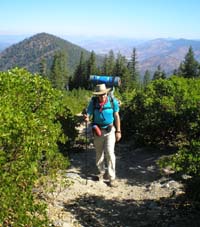 The
trail ascended steeply south in blazing sun through tall manzanita,
up a long, straight medial moraine that divided the Fox Creek
canyon to our right (west) from the West Boulder Lake drainage
to our left (east). The Fox Ridge. After a quarter mile we crossed
another graded road and entered the wilderness. As the trail
rose southward, the sparse Ponderosa pine gave way to an ever-thickening
mixed-conifer forest of white and red fir, white pine, a few
scattered incense cedars, and at least one Brewer's spruce.
The
trail ascended steeply south in blazing sun through tall manzanita,
up a long, straight medial moraine that divided the Fox Creek
canyon to our right (west) from the West Boulder Lake drainage
to our left (east). The Fox Ridge. After a quarter mile we crossed
another graded road and entered the wilderness. As the trail
rose southward, the sparse Ponderosa pine gave way to an ever-thickening
mixed-conifer forest of white and red fir, white pine, a few
scattered incense cedars, and at least one Brewer's spruce.
Nancy and Patricia would hike on ahead, then
wait for Barbara and me to catch up. This suited me, for I found
that their constant dialogue, enjoyed by many hikers, would
distract me from the silent communion with nature and each other
that Barbara and I customarily enjoyed.
After an hour of hiking, our medial moraine merged
with the terminal moraine that clothed the steep north slope
of the main mountain block. 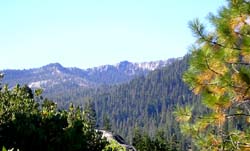 At
an open meadow, steeply tilting above a grassy swale, Nancy
and Patricia had stopped to rest. Perched on rounded granite
boulders exposed from the moraine, we ate trail bars or handfuls
of gorp and enjoyed the view north into the Scott Valley. Already
we had climbed high above Fox Creek and could see the valley
floor below us arcing southwestward, rising toward a distant
ring of jagged pinnacles and granite cliffs, which seemed to
have migrated too far north. Our orientation
had grown askew as the trail slowly wheeled, undulating in and
out of gullies and ravines. We would continue to climb, following
the greater arc of the higher mountain slope in a broad clockwise
loop until, like a horseshoe, the trail would intercept the
creek as it spilled from Fox Creek Lake.
At
an open meadow, steeply tilting above a grassy swale, Nancy
and Patricia had stopped to rest. Perched on rounded granite
boulders exposed from the moraine, we ate trail bars or handfuls
of gorp and enjoyed the view north into the Scott Valley. Already
we had climbed high above Fox Creek and could see the valley
floor below us arcing southwestward, rising toward a distant
ring of jagged pinnacles and granite cliffs, which seemed to
have migrated too far north. Our orientation
had grown askew as the trail slowly wheeled, undulating in and
out of gullies and ravines. We would continue to climb, following
the greater arc of the higher mountain slope in a broad clockwise
loop until, like a horseshoe, the trail would intercept the
creek as it spilled from Fox Creek Lake.
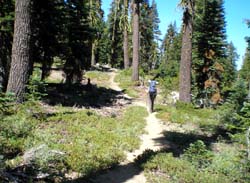 When
we resumed our hike, the trail ascended through a tilting, healthy,
northwest-facing forest underlain with glacial till, until it
gradually hooked westward, and we began to climb a series of
lovely moraine terraces. Tall red firs decorated little alpine
gardens of low manzanita and wildflowers, and brilliant white
granite rocks and boulders studded the loose duff. As we climbed,
the forest grew more open, allowing the sun to broil us as we
trudged between the shrinking islands of shade. In time the
trail crested a divide and began to drop through an open graveyard
of exhumed boulders to a dry stream bed. There we came at last
to a trail junction and a sign. One arrow pointed steeply uphill
toward the Pacific Crest Trail, several hundred feet above.
I unfolded the map. The route was called the Wolford Cabin Trail.
Beyond the crest it dropped south to Wolford Cabin and a junction
with the Granite Creek Trail in the Coffee Creek drainage.
When
we resumed our hike, the trail ascended through a tilting, healthy,
northwest-facing forest underlain with glacial till, until it
gradually hooked westward, and we began to climb a series of
lovely moraine terraces. Tall red firs decorated little alpine
gardens of low manzanita and wildflowers, and brilliant white
granite rocks and boulders studded the loose duff. As we climbed,
the forest grew more open, allowing the sun to broil us as we
trudged between the shrinking islands of shade. In time the
trail crested a divide and began to drop through an open graveyard
of exhumed boulders to a dry stream bed. There we came at last
to a trail junction and a sign. One arrow pointed steeply uphill
toward the Pacific Crest Trail, several hundred feet above.
I unfolded the map. The route was called the Wolford Cabin Trail.
Beyond the crest it dropped south to Wolford Cabin and a junction
with the Granite Creek Trail in the Coffee Creek drainage.
A few steps up the trail a second sign announced
that Mavis Lake was nigh, though not exactly where. Nancy and
Patricia conferred. "Do you want to go on up and take a
look at Mavis?" Nancy asked us. "Wherever it may be."
The hiking books had described Mavis as not very
attractive. Art Bernstein called it "shallow, mucky,"
and "not worth the long walk." The map showed the
Fox Ridge Trail continuing westward, at one point passing just
a couple hundred feet below the north end of Mavis, then on
around a ridge another mile to Fox Creek Lake. I looked at Barbara.
We were already tired and overdue for lunch. I gestured on up
the main trail, and Barbara nodded.
"I think we're gonna keep on going to Fox
Creek Lake," I replied. "Maybe we'll catch it on the
way out."
Nancy and Patricia discussed their options. Then
Nancy announced, "Patricia and I are going to go look for
Mavis."
"That's fine," I said.
"We'll see you at Fox Creek in a little
while," Barbara added.
Our companions left us, and a little further
along the trail we stopped for lunch. The last leg of the journey
climbed around an open, rocky ridge of bedrock and granite blocks,
dropped into the forested Fox Creek Valley, then climbed again
in one last scramble to the lake. Though only a mile, the hike
was tiring.
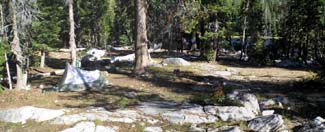 Barbara
and I arrived at Fox Creek Lake a little after two. The trail
dead ended at a primo site on the north shore of the lake (N
41 12' 41.2", W 122 50' 57.3", 6552 feet). The camp
was vacant, so we leaned our backpacks against the wall of a
massive, flat-toped boulder, big as a cabin, overlooking the
water. The ground was open, clear, flat, and spacious, with
a substantial fire ring, logs to sit on, a flat slab propped
up for a table, and easy access to the lake. The sturdy forest
of red fir, mountain hemlock, and lodgepole and white pine provided
plenty of shade and hammock sites. A narrow buffer of trees
and brush separated us from the lake.
Barbara
and I arrived at Fox Creek Lake a little after two. The trail
dead ended at a primo site on the north shore of the lake (N
41 12' 41.2", W 122 50' 57.3", 6552 feet). The camp
was vacant, so we leaned our backpacks against the wall of a
massive, flat-toped boulder, big as a cabin, overlooking the
water. The ground was open, clear, flat, and spacious, with
a substantial fire ring, logs to sit on, a flat slab propped
up for a table, and easy access to the lake. The sturdy forest
of red fir, mountain hemlock, and lodgepole and white pine provided
plenty of shade and hammock sites. A narrow buffer of trees
and brush separated us from the lake.
Our water bottles were empty, so Barbara unstrapped
the gallon plastic jug while I pulled out the water filter and
pump. We waited to deploy the rest of our equipment until our
companions arrived and bestowed site approval. That gave me
the chance, as was my habit, to explore the vicinity for alternative
campsites before commitment.
The campsite was perched on
the domed lip of the bedrock bowl that held the lake, and was
paved with exposed boulders, glacial till, and forest duff.
We found an easy path down to the water's edge and stood on
the long north shore looking south across the lake. The water
had dropped two feet from its high mark of earlier in the season,
leaving the shore wide and grassy, an easy corridor around the
lake. The ridge to our left (east), around which we had horseshoed
in from Mavis Lake, was low, but ascended southward to a high,
distant crest. Beneath the ridge the water was shallow, with
broad patches of lilypads wavering offshore from green swathes
of grassy meadow.

Palpably missing across the lake was a sheer
granite headwall. Instead, a rising bowl of dense forest stretched
up and away for half a mile, obscuring the white granite rock
and talus from which it grew. Above and behind this imperfect
forest curtain, patches of talus, rock cliff, and ridge crest
spires peeked through. To the southwest loomed a high crenelated
dome of exposed granite, the highest point, from which a bare
leg of slickrock granite descended to plunge beneath the deep
water and dam the west end of the lake. The map showed it to
be a ridge that divided Fox Creek Lake from the canyon beyond,
which harbored Virginia Lake. We heard voices coming from that
direction. We were, alas, not alone.
After sculpting this lake basin, the glaciers,
as they withdrew to a higher, colder clime, had carved the upper
canyon, rock by rock and grain by grain, in a series of bedrock
cirques and terraces, then partially refilled them with stones
and till released from the melting ice and blocks of granite
split off from the towering cliffs above and sledded down the
snow. In the distance to the southeast was our longest view,
a valley that offered a glimpse of a sheer cliff, which probably
stood as the headwall above Section Line Lake. The ridge above
it provided a fairly level base on which the Pacific Crest Trail
could traverse east and west.
Mr. Popper stood here once, beheld this vista.
I wondered what became of all his memories. They had begun to
fade like photos left out to bleach in the sun before the album
was finally closed. As had my own. Was that not why I scribbled
down these frail accounts?
Barbara volunteered to dip water from the lake
and pump it into drinking bottles while she waited for Nancy
and Patricia at the campsite. In quest of a more perfect campsite,
I strolled along the shore toward the granite ridge rising over
the west end of the lake. Two men were standing on a huge, rounded
boulder that plunged into deep water. They were neatly dressed,
perhaps in their twenties, and engaged in a loud banter as if
strutting on the frat house steps for all to see. As I approached,
I discovered a third man leaned against the rocks and actually
typing something into his laptop. Their bright polo shirts and
neatly creased golf shorts seemed out of place in the wilderness.
Overlooking the lake, yet oblivious to it, they seemed bent
on bludgeoning into submission everything wild and sublime with
cleverness, their dandy clothes, and digital toys. They made
a point of ignoring me.
I passed a little patch of water lilies floating
in the shallows, then, just before the trail entered a grove
of alders at the northwest corner, I sang out cordially, "Hello.
You fellows come in on the Fox Ridge Trail?"
The nearest deigned to twist his head. "No.
Came in the other way." He waved vaguely over the
distant mountain as he turned his back on me. Dismissed. Conversation
ended.
So I followed the trail through the alders and
climbed up the slickrock saddle behind them searching for campsites
beyond. Their tents and backpacks were crowded into a small
clearing behind the rocks, and I veered around it as much as
the terrain would allow. Beyond them I continue a short distance
along the west shore trail and found a couple of small, rough
campsites, but it soon became apparent we had already taken
the best.
Back at camp I related my close encounter to
Barbara as we pitched our tent in a flat clearing well away
from the substantial rock fire ring. We had learned long ago,
when camping with others, not to set up too near the campfire
lest fireside prattle keep our slumber at bay.
Nancy and Patricia arrived a short time later.
Pleased with our choice of campsites, they propped their packs
against the big rock.
"How was Mavis?" Barbara asked.
"Small and shallow," Nancy replied.
"But it didn't dissuade Patricia from taking a dip."
"There was a nice sandy beach," Patricia
explained.
We all walked down to the
lake. The water was a perfect temperature for a swim, so we
strolled west along the shore in search of a good spot. The
young frat boys had retired to their campsite, but when they
saw three females had arrived, they clambered out onto the rocks
again, pretending to fish. The gawking made the women uncomfortable,
so they retreated eastward along the shore. Patricia had brought
a swim suit, and Barbara and Nancy swam in their undies. Fearless,
I swam naked as usual.
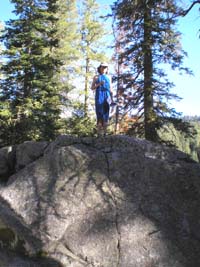 By
the time we had finished deploying our gear, cocktail hour had
arrived. Cocktail time comes early in the wilderness. Something
about warding off bears or evil spirits, I believe. Nancy, draped
in a stunning blue sarong, offered tequila around, and I our
trademark amaretto. After numerous nips and sips and slugs,
we found ourselves jabbering and laughing in hammocks strung
around the campfire ring. Life was good. The camp felt like
home. Patricia had carried in a pint of Captain Morgan's Spiced
Rum, but before we got into that bad boy, the conversation turned
to dinner.
By
the time we had finished deploying our gear, cocktail hour had
arrived. Cocktail time comes early in the wilderness. Something
about warding off bears or evil spirits, I believe. Nancy, draped
in a stunning blue sarong, offered tequila around, and I our
trademark amaretto. After numerous nips and sips and slugs,
we found ourselves jabbering and laughing in hammocks strung
around the campfire ring. Life was good. The camp felt like
home. Patricia had carried in a pint of Captain Morgan's Spiced
Rum, but before we got into that bad boy, the conversation turned
to dinner.
I built a fire and Barbara quickly hydrated and
heated freeze-dried Three Cheese Lasagna, which sobered us.
Quick, tasty, and satisfying. Ingredients were probably listed
on the package. I never looked. When we returned from washing
our bowls and pot, Nancy and Patricia were concocting their
supper from scratch. With running commentary, they mixed, sampled,
boiled, and fried an array of rices, grains, veggies, roots,
and tubers, some with unpronounceable foreign names, for their
multi-course repast. It was like watching the cooking channel.
Patricia and Nancy had both brought tents, but
chose not to deploy them that night. Patricia spread her sleeping
bag out on a plastic ground cloth beside the big rock. Nancy
set hers up on top. We cautioned her about sleepwalking in the
dark, which might result in a ten-foot plunge, but she was not
too worried. The stars overhead made the risk worthwhile. As
darkness enveloped, we crawled into our tent.
Saturday morning Barbara and I arose with first
light, as was our custom, built a small fire to boil water,
and prepared our mocha and tea as silently as possible, so as
not to waken our comrades. Then we meditated for the better
part of an hour on our pads by the water's edge. When we returned
to camp for breakfast, our friends were just getting up and
beginning to fill the morning with the cheerful domestic banter
of an ordinary kitchen. Barbara joined in. Why, I wondered,
do folks so love to prattle on about food? Free range food.
Wild food. Nutritious food. Pernicious food. Ethnic food. Domestic
food. Exotic food. Erotic food. Flavor. Texture. Recipes. Cooking.
Buying. And always the restaurants with interesting menus.
Excusing myself, I retired to the lake shore
to commune with the voices of nature. The murmur of conversation
and laughter wafted down pleasantly from camp, a sound as natural
as the buzzing of cicadas. And as long as I could not make
out the words, those pesky little pirates could no longer
hijack my attention.
After breakfast Nancy and Patricia announced
that they had decided to backpack up to Virginia Lake and stay
overnight. We offered to dayhike along with them. Using the
GPS and dead-reckoning, we crossed the slickrock saddle above
the frat boys camp until it dropped into a thick forest on the
other side, where we found and followed sporadic cairns and
a few faint tracks. There was no trail. Our path looped back
southward and climbed through the woods at the margin between
the exposed granite blocks and talus above and the impenetrable
willows, alders, and brush that choked the valley floor below.
The pitch was steep and grew steeper.
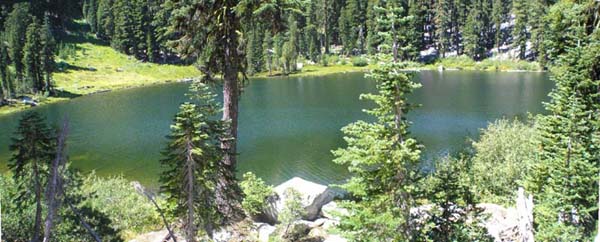
Unable to follow the brush-choked outlet stream
from Virginia Lake, we instead were forced to scramble ever
higher into the sharp-edged granite blocks until we finally
crested a slickrock ridge to gaze down at Virginia Lake far
below us. For me the climb was deja vu. I had harbored a vivid
memory of this same approach, but could never have recalled
where or when it had taken place.
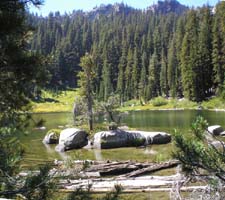 Barbara
and I were glad not to be toting backpacks as we all scrambled
down the talus slope to the water's edge. We arrived near a
picturesque little island at the outlet. Virginia was smaller
and cozier than Fox Creek Lake. More secluded. More remote.
The towering headwall of bedrock granite, being nearer, seemed
more sheer. Below the headwall, thick forest encircled the lake,
climbing from the grassy shore into the rough granite blocks
and talus split off from above. A wild place it was.
Barbara
and I were glad not to be toting backpacks as we all scrambled
down the talus slope to the water's edge. We arrived near a
picturesque little island at the outlet. Virginia was smaller
and cozier than Fox Creek Lake. More secluded. More remote.
The towering headwall of bedrock granite, being nearer, seemed
more sheer. Below the headwall, thick forest encircled the lake,
climbing from the grassy shore into the rough granite blocks
and talus split off from above. A wild place it was.
Nancy and Patricia found a perfect campsite right
beside the water (N 41 12' 20.4", W 122 51' 26.7",
6840 feet). No one else was there. The shore was brushy and
the lake's edge shallow, providing no easy access to the water,
except for a massive fallen log that entered the lake like a
dock. Nancy and Patricia swam off the log. The water, they claimed,
was cooler than Fox Creek Lake.
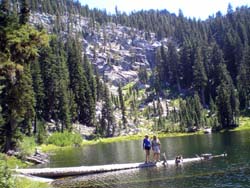 As
we picked at our lunch beside the fire ring, two women climbed
down the talus slope to join us. They wore khaki shirts with
Forest Service patches. The leader appeared to be in her forties.
Her companion was much younger, perhaps twenty, still in college
and learning the rangerette trade as a summer intern. They had
come around to check the campsites and clean out the fire pits.
We chatted as they dug out the ashes and dispersed them in the
surrounding bushes. We had plenty of questions for them, like
identifying trees and brush, and the best cross-country routes
to the PCT and Section Line Lake. They were agreeable and, in
the spirit of the Big Ranger, happily answered as best they
could, even though they were on a tight schedule and had to
make it back to their truck by nightfall. Then we watched them
circle the small lake, stopping to clean out fire pits and pack
out trash from two or three campsites we had not suspected were
there.
As
we picked at our lunch beside the fire ring, two women climbed
down the talus slope to join us. They wore khaki shirts with
Forest Service patches. The leader appeared to be in her forties.
Her companion was much younger, perhaps twenty, still in college
and learning the rangerette trade as a summer intern. They had
come around to check the campsites and clean out the fire pits.
We chatted as they dug out the ashes and dispersed them in the
surrounding bushes. We had plenty of questions for them, like
identifying trees and brush, and the best cross-country routes
to the PCT and Section Line Lake. They were agreeable and, in
the spirit of the Big Ranger, happily answered as best they
could, even though they were on a tight schedule and had to
make it back to their truck by nightfall. Then we watched them
circle the small lake, stopping to clean out fire pits and pack
out trash from two or three campsites we had not suspected were
there.
In mid-afternoon Barbara and I found our way
back to our camp at Fox Creek Lake. Having done it once, backtracking
the route was not as difficult. The frat boys had quieted down,
perhaps hungover. We went for a lazy swim, then laid on our
mats in the sun by the water. A man and boy, probably father
and son, wandered silently along the opposite shore, fishing.
We could not tell if they were dayhiking or backpacking. Later
we saw smoke from their campfire behind a stand of tall red
fir beyond the meadow at the southeast corner of the lake. Quiet
as shadows, they did not bother us.
The afternoon daydreamed past in a flash of silver,
and we were unable to tell if it was fish or water. A handsome
osprey fished the lake for our amusement. We saw water ouzels,
cormorants, flickers, chickadees, juncos, redbreasted nuthatches,
and hummingbirds. Though we enjoyed our tribe of four, the best
of all worlds allowed us to have a single night to ourselves.
The wind came up that night, rushing through
the branches with the roar of white-capped breakers. Gusts flapped
the walls of our tent. But inside we slept warm and snug.
Sunday morning was still breezy and colder. We
found harbor in the lee of the big rock, where we drank our
tea and mocha bundled in down jackets, enjoying the soughing
of the wind. From our new perspective, we determined that the
stout tree leaning over our tent was in fact dead and rotting.
Luckily the gusts had not blown it over and squashed us like
bugs. How, after all life's fuss, would that look on
the obituary page? The wilderness is not your Forest Service
campground, where hard-hat workers behind bands of yellow tape
prune away hazard trees and branches. Here, on your own, you
have to pay attention. So after breakfast, we dragged our tent
away from the snag.
Nancy and Patricia returned sometime after breakfast,
just as I was loading my daypack to hike up to Section Line
Lake. They had returned to our lake through the campsite formerly
occupied by the three frat boys, who had packed up and left
already. We never did find out which trailhead they used.
Nancy and Patricia decided to hike back to Mavis
on the Fox Ridge Trail, then take the Wolford Cabin Trail up
to the PCT and head west. Patricia had an older Forest Service
map that showed a little spur trail off the PCT dropping down
to Section Line Lake. My more recent map showed no such spur,
indicating that it was no longer maintained. I retold my tale
of the suicidal scramble down the cliff face to Section Line
Lake with Mr. Popper, but she and Nancy wanted to give the new
route a try. If the going got tough, they would turn back. In
the late morning they headed off.
I resolved to cross-country directly up to Section
Line Lake. Mr. Popper must have led us back that way 25 years
ago, and since I could remember nothing of the hike, it must
have been significantly uneventful. Barbara would stay behind
because her achilles tendon was acting up.
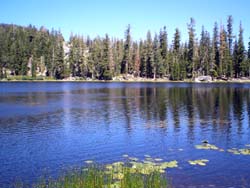 Barbara walked with me along a fisherman's
trail on the eastern shore to the big meadow at the southeastern
corner. There we crossed an inlet stream, which I presumed was
flowing out of Section Line Lake 500 feet above. We found a
large, empty campsite containing two stout trees with deep blazes.
I interpreted the blazes to be the gateway to the upper lake.
Up the slope I also found several cairns that looked like the
beginning of a trail. We had a leisurely lunch viewing the lake
from a new perspective. Barbara spotted a kingfisher she wanted
to keep an eye on.
Barbara walked with me along a fisherman's
trail on the eastern shore to the big meadow at the southeastern
corner. There we crossed an inlet stream, which I presumed was
flowing out of Section Line Lake 500 feet above. We found a
large, empty campsite containing two stout trees with deep blazes.
I interpreted the blazes to be the gateway to the upper lake.
Up the slope I also found several cairns that looked like the
beginning of a trail. We had a leisurely lunch viewing the lake
from a new perspective. Barbara spotted a kingfisher she wanted
to keep an eye on.
After lunch I clambered up the steep bluff and
found a faint use trail marked with sporadic cairns. Soon the
cairns ran out, so I followed the arrow on my GPS into which
I had programed the coordinates for Section Line Lake. 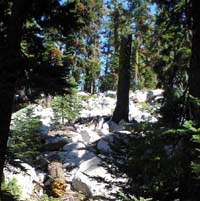 The
route was steep and brushy, climbing the eastern slope of a
broad, shallow canyon down which flowed a stream. I assumed
the stream was pouring out of Section Line Lake. The valley
floor became too overgrown to follow the stream directly, so
I climbed higher into the broken talus. The scramble was more
difficult than I expected.
The
route was steep and brushy, climbing the eastern slope of a
broad, shallow canyon down which flowed a stream. I assumed
the stream was pouring out of Section Line Lake. The valley
floor became too overgrown to follow the stream directly, so
I climbed higher into the broken talus. The scramble was more
difficult than I expected.
I was ascending a north-facing,
thickly forested slope. The GPS lost the signal as the satellites
dropped below the massif ahead, and thus kept pointing in the
same direction. Finally I topped a treeless ridge, balancing
in the middle of a field of sharp-edged granite boulders, and
got a fresh reading. I had missed the lake by only a couple
hundred feet, but the terrain was too rough to simply cut across
to the lake. I had to backtrack down to the duff of the forest
floor, traverse over to the right, and climb again. It turned
out the stream I was following was not flowing out of Section
Line Lake after all, but from a series of springs in a ferny
glade below the lake. I crossed above the springs, then headed
uphill again. It had taken me forty minutes to find the lake.

From the north ridge of the cirque above the
Section Line Lake, I called Barbara on the radio and told her
the climb had been rough going. 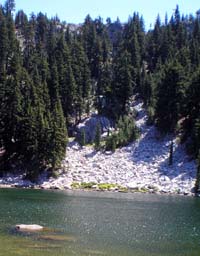 Then
I dropped down to the northwest shore (N 41 12' 088.9",
W 122 50' 41.6", 7065 feet). The lake was small and intimate
beneath a towering headwall, down which tumbled a swath of sharp,
white rock, pried loose by water freezing in the cracks and
seams of the granite cliff face. Enormous boulders pocked the
landscape, one near the outlet, which no longer flowed. The
green, rippling water was shallow near the north shore, but
plunged deep below the headwall. A healthy forest had gained
foothold in the rocky soil. The shore was bearded with low azalea,
heather, and grass, through which a faint fishermen trail wound
among the boulders.
Then
I dropped down to the northwest shore (N 41 12' 088.9",
W 122 50' 41.6", 7065 feet). The lake was small and intimate
beneath a towering headwall, down which tumbled a swath of sharp,
white rock, pried loose by water freezing in the cracks and
seams of the granite cliff face. Enormous boulders pocked the
landscape, one near the outlet, which no longer flowed. The
green, rippling water was shallow near the north shore, but
plunged deep below the headwall. A healthy forest had gained
foothold in the rocky soil. The shore was bearded with low azalea,
heather, and grass, through which a faint fishermen trail wound
among the boulders.
As I circled clockwise taking pictures, I became
aware of two young women on their hands and knees in the short
brush and heather beside the water on the southeast shore. They
were not sunbathing, but fully clothed, with broad floppy hats.
They were preoccupied doing something slowly, painstakingly.
Perhaps picking berries?
"Hello!" I called out from a hundred
feet away.
One sat up. "Hello." Her calm voice
carried nicely over the still water.
"Have you seen two women hiking down from
the crest trail?"
"No. You're the first person we've seen
today."
"Are you camped up here?"
"Yes," she replied. "Over in those
trees." She pointed to a small stand behind her, away from
the lake.
"Is there a trail up here?" I asked.
"Yes. A rough one. From Mavis."
I explained briefly that I was supposed to meet
Nancy and Patricia here. "If you see them, let them know
I was already here and gone."
"Okay." She went back to whatever she
was doing. Apprehensive, I approached no closer. Perhaps they
were up to something kinky. How would I know? There were more
things in this universe than what my philosophy encompassed.
I decided to let them have their space and turned back to retrace
my steps to the far shore. There I sat on a boulder for a while
and took a few more photos. Then I headed back down.
While I was away, Barbara
saw two young guys fishing, probably dayhikers, as she completed
her clockwise loop back to camp. She was relaxing at our campsite,
thinking all the dayhikers had left, when she was stunned by
three thunderous gunshots nearby, right at the lake. She scrambled
behind a boulder and kept her head down, her heart trip-hammering.
But there were no more shots, and she never saw who it was.
I called about fifteen minutes later to say I was almost down
to our lake, and that I, too, had heard the shots echoing through
the canyon. I saw no one on my way around the lake.

We walked over to the granite boulders near the
frat boys' campsite and swam off the rocks, then rested awhile.
It gave us yet another perspective. The weather was a little
cooler and windier than before, but plenty warm in the sun.
Nancy and Patricia got back around five. They
had arrived at Section Line after I left and talked with two
women camped there. They were doing a frog survey for Redwood
Sciences Laboratory. The frog populations of these lakes had
been decimated in recent years, probably because the Forest
Service had been stocking the lakes for years with non-native
fish. Now the stocking had stopped, and biologists wanted to
know if the frog population was coming back. (See Effects
of Introduced Fish on Native Biodiversity and Ecosystem Subsidy.)
What I had considered odd behavior, now made sense. The women
had been counting frogs.
A cairn had marked the cutoff trail from the
PCT. The hike down to Section Line Lake had not been difficult.
From Section Line they had come back to camp a different way
than I. We all agreed that it was steep and rough no matter
which way you go.
We had Fox Creek Lake all to ourselves. Nancy
chose to deploy her tent for the final night. "As long
as I carried it up here," she said. I recognized it as
the old one-person tent Mr. Popper had crawled into years ago.
She had inherited it. The next morning she would tell us, "It
was like sleeping in a sarcophagus."
It was pleasant again to sit around the fire
with the whole tribe and watch the stars come out. We finished
Patricia's rum. The tequila and amaretto we would carry out.
That night was cold enough for me to zip up my bag, even with
the tent fly on.
Monday morning we left around eleven, stopping
at the outlet to watch a Cooper's Hawk chasing Barbara's kingfisher.
We did not stop at Mavis Lake. If Barbara has taught me anything
over the years, it is the hollowness of peak bagging. Or lake
bagging. Just to say you have been there. For all I could remember,
I may have been to Mavis twenty-five years ago. I cannot
recall, and it doesn't matter.
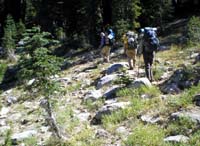 The
return trek through the beautiful moraine terraces was particularly
agreeable. After a while, though, the downhill trudge became
wearisome, as it always does. For me this backpack had renewed
old acquaintances. With the lakes. With the route. With Mr.
Popper. With Nancy. With Barbara. With myself. As usual, I was
not the same person who had hiked in. But was I any wiser? Probably
not.
The
return trek through the beautiful moraine terraces was particularly
agreeable. After a while, though, the downhill trudge became
wearisome, as it always does. For me this backpack had renewed
old acquaintances. With the lakes. With the route. With Mr.
Popper. With Nancy. With Barbara. With myself. As usual, I was
not the same person who had hiked in. But was I any wiser? Probably
not.
Just beyond the wilderness boundary sign a single
car was parked on the first dirt road crossing the trail, just
above the hot, steep, exposed final descent. We figured it probably
belonged to the two women at Section Line Lake. When I planned
the trip, a ranger had told me about a jeep road that ends right
there at the boundary, cutting off a quarter mile of steep uphill.
But we had been in too much of a hurry to look for it.
Ours were the only cars parked at the trailhead.
The sun was blazing hot. Nancy and Patricia had beaten us back
by fifteen minutes, and they were ready to move on. Nancy wanted
to drive in to Etna and get her spare tire repaired. Since we
planned to head north to our cabin through Etna anyway, we agreed
to look for them there.
We found Nancy and Patricia at the gas station
on Highway 3 on the outskirts of town. They had searched for
a garage to fix the flat, but couldn't find anyone to do the
job. So they bought a can of "Fix-a-Flat" at a hardware
store and were heading for home. We bid each other farewell
and went our separate ways.
Return to Backpacking
in Jefferson